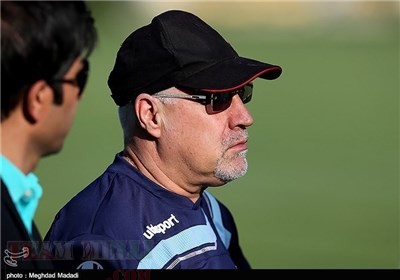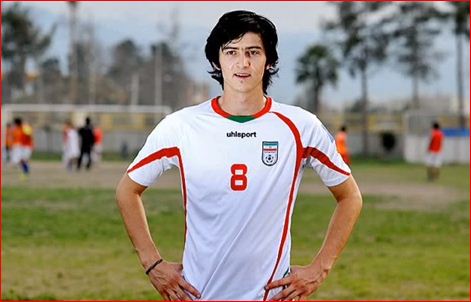When the Colombian referee, Guilermo Velasquez whistled for the end of the match in the Municipal Stadium , Sherbrouke , on 25th of July 1976, he put to an end what would have been a true shock to the world football system. Iran was playing against the mighty Soviet Union with its full force of senior players, in the quarter finals of the Olympic games. Iran was one goal from reaching the semifinals and perhaps the gold medal match, but for that Colombian whistle. The Soviets where comfortably leading 2-0 until the 80th minute when a penalty was called for Iran. Ghleechkhani converted to make it 2-1. Following that goal, Team Melli went for an all-out assault. Heshmat Mohajerani urged his men to venture forward and attack, the Iranian players responded well while the Soviets were of the defensive. The equalizer seemed to be coming any minute and with it , the extra time. But , it was not meant to be as the gallant Persian warriors ran out of time. So near and yet so far.

2-1 for the Soviet Union. Iran lost the match but gained immense respect from the football community , after all losing to players in the class of the European player of the year Oleg Blokhin , was no disgrace. Middle East , was an emerging football region and Iran was proudly leading the way. But who would have predicted that it will take Iran 9 Olympic tournament and 38 years (40 years by the time the games start in Rio) to qualify once again for the football tournament ? assuming Iran will do it this time.
Olympic Games football changed quite a lot. FIFA and IOC decision to restrict the teams to U-23 players , opened the door for the emerging football nation to compete for glory , and compete they did , Nigeria, Ghana, Cameroon , South Korea and Mexico all had won medals and titles in the Olympic games since the rule changes. In all of that, Iran’s name was conspicuously absent. Iran’s football was truly missing since that Canadian summer evening in July 1976.
The reason for Iranian failures at this level of football is so plentiful and diverse; it needs a whole book to give it the necessary justification. Suffice to state the obvious and that is the Iranian football community, in general, does not grant this age level and younger players the respect, recognition, care and the attention it needs to qualify at the highest level of World Football. In fact, it is even struggling at continental level at present.
In comes one Nelo Vingada. A compatriot and a close friend of Team Melli head coach, Carlos Queiroz to save the day for the Iranians and for the first time in 40 years , give Iranian fans the one thing they truly missed for decades . A smile and a wave by Iranian footballers in the opening ceremony of an Olympic games. Iran had plenty of success in Wrestling, Weightlifting and Martial arts, but football is not normally considered as an award or title wining sport of the country.
Vingada is quite gifted at this level of football with a track record that could be the envy of many coaches. On his trophy chest, there is two FIFA U-20 World Youth championship won for his country as an assistant beside no one other than Queiroz himself. Vingada went on to coach Portugal U20 as head coach , Saudi Arabia, Egypt U20 and Jordan amongst the many sides he coached and managed.
Now it is the turn of Iran’s Olympic team to get the benefit of the Portuguese coaching experience and success. Vingada, along with his Iranian assistant Human Afazeli , have been working hard for a few months now on preparing the U23 for their first real test , the Asian Games in Incheon. The signs are mixed so far but it has not been a smooth paved surface.
There have been many absentees form the original list of players announced by the coaching team due to the players club commitments. The likes of Payam Sadeghian , Mohsen Mosalman , Mehdi Sharifi , Alireza Jahanbakhsh , Sardar Azmoun and quite a few others , who are established players with their clubs now be it in Iran or abroad. Clubs will not release such players for the Olympic squad so easily while they are beginning the new season.
There is no prefect scenario for Vingada, who at the end of the day, has to work with whatever resources that are available to him. But then again, Iran is definitely not the only nation that faces such a dilemma. Others worked out some kind of a system to ensure the parallel availability of the players for their clubs and Olympic team. The onus is on the Iranian football federation to produce an appropriate program that can be helpful for the Olympics squad.
The track records, unfortunately, indicates that the federation has been pathetic at programing and management at Olympics football level. Suffice to mention that the last effort for the London Olympics 2012 ended in true humiliation and a whole set of red faces after Iran U-23 were declared loser against Iraq for fielding an ineligible player who had two yellow cards and was suspended,
Needless to say that everyone did the usual finger pointing but no investigation to find where the fault was, no gap analysis, no accountability, no one was really identified as the culprit and life went on merrily at the FFIRI as it usually does under the all smiling Kaffashian!
To expect a major improvement in programming, support and the mentality to back the U23 system in general , is perhaps asking too much. There might be a slight improvement in some areas, and we hope that a man is assigned with a pencil and paper to record the number of players’ yellow cards, but Vingada should not count on a whole-hearted 100% backing for his work. The usual difficulties will still prevail. If Vingada has strong aspiration, he has to do many things on his own.
